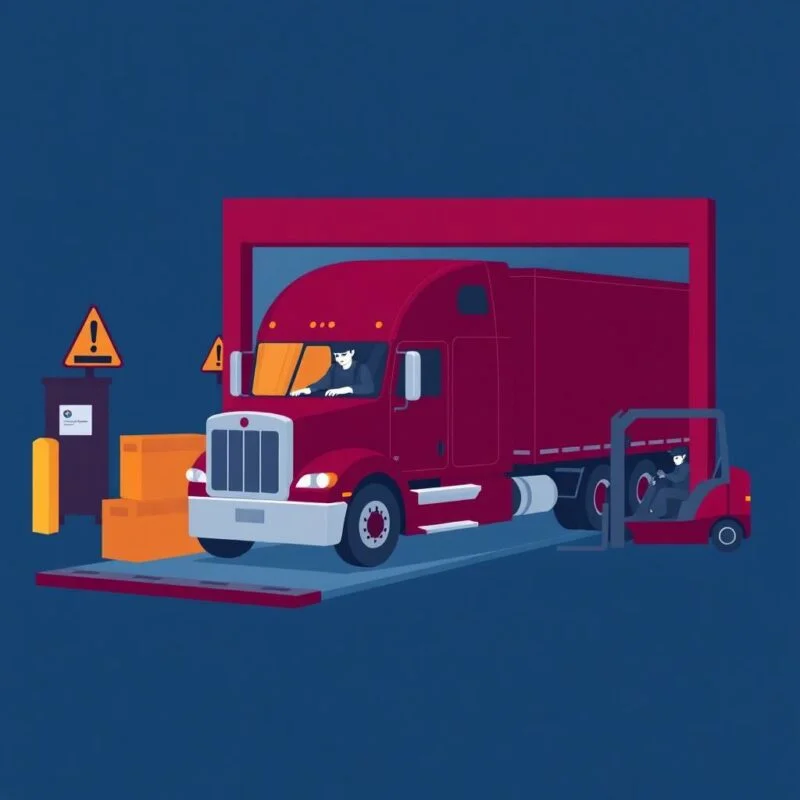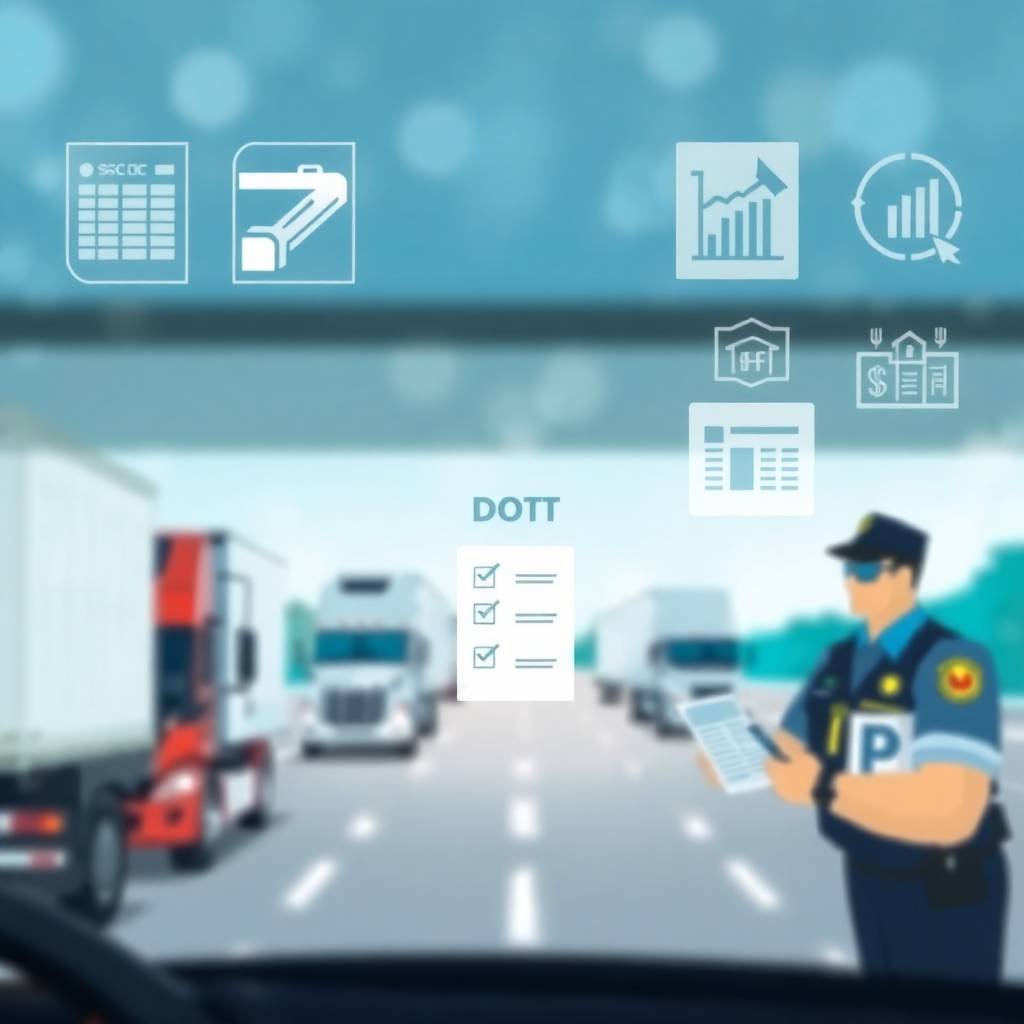1. What Triggers a DOT Audit and Why It Matters in 2025
DOT audits in 2025 are no longer rare or random. With advancements in digital tracking, real-time data monitoring, and federal enforcement policies, audits are being triggered with increasing frequency. For carriers, that means one thing: DOT Audit Preparation is no longer optional—it’s essential for operational survival.
Understanding what triggers an audit and how to prepare can be the difference between a clean record and costly penalties. If you’re not ready, now is the time to schedule your DOT audit readiness consultation with a compliance expert.
Top DOT Audit Triggers in 2025
Audits are generally triggered by one or more red flags picked up by the FMCSA’s Safety Measurement System. Here are the most common triggers:
- Poor BASIC Scores: Unsafe driving, vehicle maintenance violations, and Hours of Service (HOS) infractions are leading causes.
- Crash Involvement: Accidents—regardless of fault—can initiate an audit.
- Roadside Inspection Violations: Repeated violations during inspections, such as missing logs or expired credentials, can prompt federal review.
- New Entrant Status: All new carriers must undergo a safety audit within 12 months of obtaining operating authority.
- Complaints: Anonymous tips from the public or disgruntled drivers can also trigger a compliance review.
The smarter path is proactive DOT Audit Preparation—not reaction after the notice arrives.
Why DOT Audit Preparation Should Be Ongoing
Audit readiness isn’t just about having the right forms—it’s about maintaining a culture of compliance. If you wait for the FMCSA to notify you, you’re already behind. Regular internal reviews and proper documentation are essential.
Our experts guide you through each requirement listed in the DOT Compliance Checklist for Owner-Operators, including drug and alcohol testing, driver logs, maintenance files, and more.
Additionally, staying current on your UCR Filing Deadlines is a vital part of audit readiness. A missed registration can become a violation that escalates into a full audit.
What Happens During a DOT Audit
An audit will typically review:
- Driver Qualification Files (see our detailed guide on Driver Qualification File Requirements)
- HOS records and ELD data
- Vehicle inspection, repair, and maintenance logs
- Insurance certificates and accident reports
- Drug and alcohol testing program documentation
- Business registration, including authority and UCR
If any of these elements are incomplete or missing, your operation is at risk. That’s why DOT Audit Preparation must be structured, not rushed.
How to Protect Your Operation Now
Instead of guessing your way through a complex audit process, let a professional help you streamline every file and policy. Our team provides hands-on support, based on the latest FMCSA Compliance Requirements for Trucking Companies.
To stay compliant, protect your CSA scores, and avoid costly interventions, the first step is simple: book a free audit readiness consultation.
DOT Audit Preparation in 2025 is not just about survival—it’s about strategic advantage. Stay ahead of enforcement and on the road to long-term success. DOT Audit Preparation begins before the audit notice. Don’t wait.

2. DOT Audit Preparation: What You Need to Have Ready
For owner-operators and small fleets, nothing disrupts operations like a DOT audit. In 2025, with tighter enforcement and stricter oversight from the Federal Motor Carrier Safety Administration (FMCSA), being caught unprepared is no longer an option. Proactive DOT Audit Preparation helps you avoid penalties, improve safety scores, and protect your operating authority.
This guide outlines exactly what you need to have ready before an audit—and how to streamline your process with expert help.
Why DOT Audit Preparation Starts Now
DOT audits are triggered by red flags such as poor CSA scores, roadside inspection violations, or even random selection. Whether you’re new to the industry or managing multiple trucks, you need a compliance strategy. That strategy starts with solid DOT Audit Preparation.
Our experts can walk you through every step. If you want help reviewing your readiness, you can schedule a free consultation with our compliance team today.
Must-Have Documents for DOT Audit Preparation
- Driver Qualification Files
Every driver must have a complete DQ file, which includes their application, MVR, medical certificate, previous employer verification, and road test certification. Review our Driver Qualification File Requirements guide to ensure yours meet FMCSA standards. - Hours of Service and ELD Logs
Logs must be accurate, stored properly, and available for review. Falsified logs are one of the fastest ways to trigger violations. A core part of DOT Audit Preparation is making sure these records are up-to-date and legally compliant. - Vehicle Maintenance Records
You must maintain detailed records of inspections, repairs, and maintenance schedules. These files should match your truck’s history and support your overall safety program. - Drug and Alcohol Testing Program Documents
Your DOT Audit Preparation should include records of pre-employment, random, post-accident, and return-to-duty drug tests. If you aren’t enrolled in a testing program, you’re already out of compliance. - Accident Register and Insurance Certificates
FMCSA auditors will ask for proof of all reportable crashes and the required $750,000 minimum liability insurance. A good checklist—like our DOT Compliance Checklist for Owner-Operators—ensures nothing gets missed. - Business and Operating Authority Documents
Make sure your USDOT number, MC authority, and UCR Filing Deadlines are all current. Check your status directly through the FMCSA Company Snapshot.
What to Expect During the Review
DOT auditors may request these documents in-person or through electronic upload. Being disorganized or unresponsive can escalate the audit and result in violations. Our article on How to Prepare for a Compliance Review offers a full walkthrough.
Protect Your Fleet with Expert Support
Effective DOT Audit Preparation isn’t about doing more paperwork—it’s about understanding what matters to regulators and keeping your operation ready year-round. For a personalized review and file assessment, book your compliance session now with our expert team.
The rules are changing fast. Don’t risk your business—make DOT Audit Preparation part of your safety culture today.

3. Common Mistakes That Hurt Carriers During a DOT Audit
Failing a DOT audit can lead to serious consequences—fines, downgraded safety ratings, or even revoked operating authority. In 2025, stricter enforcement and electronic tracking have made compliance more critical than ever. For owner-operators and small carriers, the best defense is solid DOT Audit Preparation. But too often, carriers overlook key details that can trigger violations and penalties.
Here are the most common mistakes that hurt carriers during a DOT audit—and how proper DOT Audit Preparation helps you avoid them.
Incomplete or Disorganized Driver Qualification Files
Missing or incomplete DQ files are one of the top audit failures. Each file must include a driver’s application, MVR, medical certificate, safety performance history, and more. Auditors expect every file to be current, consistent, and easy to access.
If you’re unsure whether your files meet FMCSA standards, our guide to Driver Qualification File Requirements breaks it down step-by-step. Carriers who prioritize DOT Audit Preparation review these documents quarterly—not just before an audit.
Failure to Maintain Accurate HOS and ELD Records
Falsified or missing Hours of Service logs are among the most penalized violations. Electronic Logging Device (ELD) data must match the carrier’s dispatch records and be available for six months. Audit-ready carriers ensure their ELD systems are functional, synced, and properly trained on by all drivers.
Thorough DOT Audit Preparation includes reviewing ELD compliance, correcting HOS errors, and ensuring logs are stored per FMCSA regulations.
Neglecting Vehicle Maintenance Documentation
FMCSA requires a detailed log of every inspection, repair, and maintenance action taken on each commercial vehicle. Many carriers only keep shop receipts, which don’t meet audit standards.
During DOT Audit Preparation, your team should review all maintenance files and ensure they align with your preventive maintenance program. Our DOT Compliance Checklist for Owner-Operators includes a full list of required maintenance documentation.
Lapsed Drug and Alcohol Testing Compliance
Failing to maintain a drug and alcohol testing program—or having no proof of participation—is a critical audit failure. Whether you’re managing one driver or 100, your program must include pre-employment, random, post-accident, and return-to-duty testing.
During your DOT Audit Preparation, confirm your program is active and that all required records are retained per DOT drug and alcohol testing regulations.
Missing UCR and Operating Authority Filings
Some carriers overlook simple filings like their annual Unified Carrier Registration. Missing this deadline—even if your operations are otherwise compliant—can trigger enforcement action. Review your UCR Filing Deadlines regularly and confirm that your USDOT number and MC authority are active with FMCSA’s Company Snapshot.
Take Control Before an Auditor Arrives
Each of these mistakes can be avoided with proper DOT Audit Preparation. Don’t wait until you receive an audit notice to get your operation in order. The most successful carriers build audit readiness into their monthly workflow.
Want to protect your fleet from costly surprises? Schedule a free compliance review appointment today and let our experts guide your DOT audit strategy.
Smart DOT Audit Preparation starts with awareness—and ends with full confidence at inspection time.

4. How We Help with DOT Audit Preparation—Start to Finish
In 2025, DOT audits are no longer a distant threat—they’re a frequent reality for carriers across the U.S. With heightened enforcement and automated red flag systems, even a minor infraction can trigger a review. That’s why DOT Audit Preparation must be built into your business process—not treated as an afterthought.
Our team specializes in helping owner-operators, fleet managers, and small trucking companies navigate the entire DOT audit process, from initial file reviews to post-audit support. Here’s how we support your compliance every step of the way.
Step 1: Comprehensive Compliance Assessment
We begin your DOT Audit Preparation with a full review of your operation. This includes evaluating your current FMCSA standing, checking safety scores, and identifying any violations that may trigger an audit.
If you’re not sure where you stand, visit your FMCSA Company Snapshot and compare it against our FMCSA Compliance Requirements for Trucking Companies to see what gaps may exist.
Step 2: Organizing and Auditing Your Documents
Our next step is document consolidation. We help ensure all the required files for DOT Audit Preparation are in place, including:
- Driver Qualification Files (review our Driver Qualification File Requirements)
- Hours of Service logs and ELD data
- Maintenance and repair records
- Insurance certificates and accident registers
- Drug and alcohol program documentation
- Business credentials and UCR filing status
We use our DOT Compliance Checklist for Owner-Operators to ensure every critical requirement is covered.
Step 3: Mock Audits and Risk Scoring
Once documentation is in place, we conduct mock audits using the same standards employed by DOT officials. This phase of DOT Audit Preparation allows us to simulate audit scenarios, identify weak spots, and correct issues before they lead to real violations.
We review inspection data from the FMCSA’s Safety Measurement System and prepare your team for the questions, file requests, and inspection criteria used in formal reviews.
Step 4: Training and Readiness Coaching
Audit readiness goes beyond paperwork. We coach your team on how to respond to auditors, how to present files, and how to maintain professionalism throughout the process. From front-office staff to drivers, everyone receives the compliance tools needed to pass an audit confidently.
Step 5: Post-Audit Support and Long-Term Strategy
If you’ve already been audited and need help addressing violations, we’ll work with you to develop a corrective action plan. Our post-audit support ensures you don’t repeat the same mistakes. We also help you implement long-term policies to maintain DOT Audit Preparation year-round.
Book a Personalized DOT Audit Prep Session
No two carriers are alike, which is why every DOT Audit Preparation plan we build is tailored to your size, structure, and operation style. Don’t wait for a warning notice to take compliance seriously.
Book your audit preparation consultation now and get the step-by-step support your business needs to succeed under federal oversight.
With proper DOT Audit Preparation, you protect your operating authority, your drivers, and your bottom line. We’re here to make sure you’re ready—start to finish.

5. Why Owner-Operators Trust Our DOT Audit Preparation in 2025
DOT audits are becoming more frequent, data-driven, and unforgiving in 2025. For owner-operators, the risks tied to non-compliance have never been higher. One missed document, one expired policy, or one error in your records can result in fines, downgraded safety scores, or even a suspension of your authority. That’s why more independent truckers are turning to us for comprehensive, start-to-finish DOT Audit Preparation—and why they trust us to keep them protected and on the road.
A Process Built for Owner-Operators
Unlike large carriers with dedicated compliance departments, owner-operators are often managing paperwork, dispatching loads, and driving—all at once. That’s why our DOT Audit Preparation services are tailored specifically for solo and small fleet operators.
We don’t expect you to have everything perfect. We help you identify gaps, organize your documents, and build a proactive system that meets all FMCSA Compliance Requirements. Whether it’s your first audit or your fifth, we work with you to ensure you’re ready before the audit notice arrives.
Step-by-Step Guidance with No Guesswork
Owner-operators trust our team because we walk them through every step of DOT Audit Preparation, from document collection to mock reviews. We use our DOT Compliance Checklist for Owner-Operators to ensure nothing slips through the cracks.
We also help you:
- Assemble your Driver Qualification File Requirements
- Review ELD logs and HOS compliance
- Audit your maintenance records and drug/alcohol program
- Check your UCR Filing Deadlines and registration status
Everything is customized to your specific operation, ensuring your DOT Audit Preparation is accurate and efficient.
Trusted by Drivers Who’ve Been There
Many of our clients come to us after struggling with failed audits, missed paperwork, or rising CSA scores. What they find is a trusted partner that doesn’t just fix problems—but prevents them altogether.
We also help you understand how the FMCSA Safety Measurement System works and how to reduce your risk of triggering a compliance review. With us, you don’t just react to audits—you prepare for them year-round.
A Free Review That Could Save Your Authority
If you’re unsure whether your business is audit-ready, the best step you can take is to schedule a free compliance review appointment. In one short session, we’ll assess your current standing and show you exactly what needs to be addressed.
We’ve helped countless drivers build strong DOT Audit Preparation strategies that not only pass inspections but also improve safety scores, insurance rates, and customer trust.
Why Wait Until It’s Too Late?
Owner-operators can’t afford to gamble with compliance. DOT audits are not going away—and in 2025, they’re only becoming more sophisticated. Trust our team to guide you through the complexities of DOT Audit Preparation and give your business the protection it deserves.
Start today with expert guidance and peace of mind. Because when it comes to DOT Audit Preparation, trust and results go hand in hand.

Related Services
Looking to strengthen your overall compliance strategy? These services complement our DOT Audit Preparation support:
- ✅ DQ File Setup and Monitoring
Ensure your Driver Qualification (DQ) files are complete, accurate, and FMCSA-compliant before an audit hits your inbox. - ✅ Drug and Alcohol Testing Management
We manage your drug and alcohol consortium enrollment, testing schedules, and compliance reports so you’re always audit-ready. - ✅ UCR Filing Assistance
Avoid fines and registration delays with help filing your Unified Carrier Registration (UCR) on time and accurately. - ✅ IFTA IRP BOC-3 Support
We handle complex filings like IFTA fuel tax reports, IRP registration, and BOC-3 processing agent designation. - ✅ Book Your Free Compliance Review
Not sure where you stand? Schedule a 30-minute session with our team for a no-obligation audit readiness review. - ✅ Return to Homepage
Explore all our FMCSA Compliance Services for Owner-Operators.
What triggers a DOT audit in 2025?

A DOT audit can be triggered by new entrant registration, poor safety scores, complaints, or violations during roadside inspections. Random audits also occur. In 2025, FMCSA is focusing more on electronic records and HOS violations.
What documents are required for a DOT audit?

You’ll need DQ files, ELD logs, maintenance records, drug & alcohol test results, accident records, and insurance proof. A full checklist includes over 20 categories—keeping these organized is critical for passing a DOT audit.
How long does a DOT audit take in 2025?

Most audits are completed in 1–3 days, but that depends on your recordkeeping. A well-prepared operator can breeze through in less than 24 hours. Electronic document readiness is key in 2025 audits.
What’s the most common reason carriers fail a DOT audit?

Missing or incomplete Driver Qualification files, outdated drug testing compliance, and hours-of-service violations are the most frequent audit failures. These issues are easily preventable with regular internal reviews.
How can I prepare for a DOT audit in 2025 without stress?

Use a compliance service that offers audit prep, document templates, and mock audits. Automate file updates and maintain digital copies. Our service provides an easy-to-follow roadmap to stay audit-ready all year.
